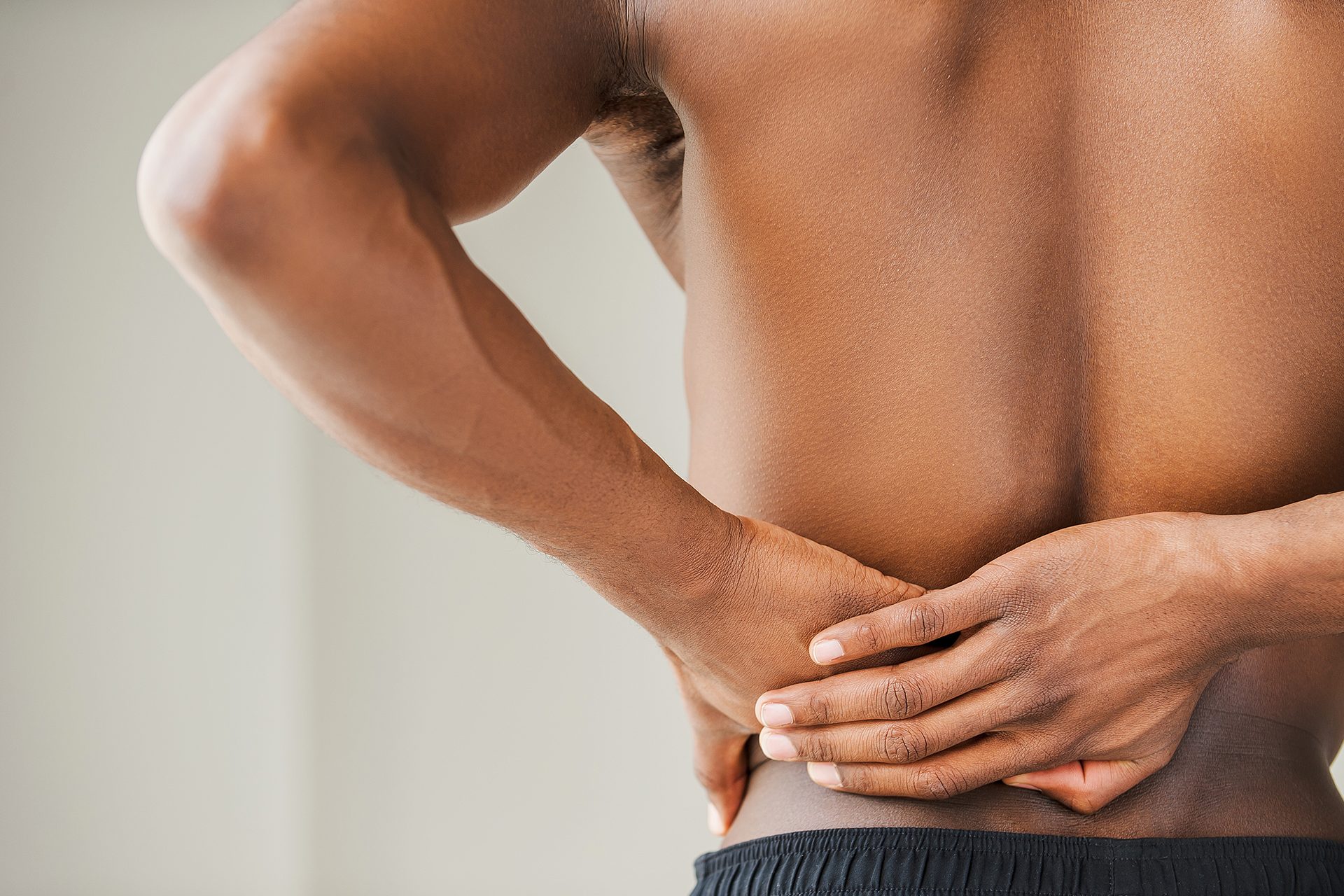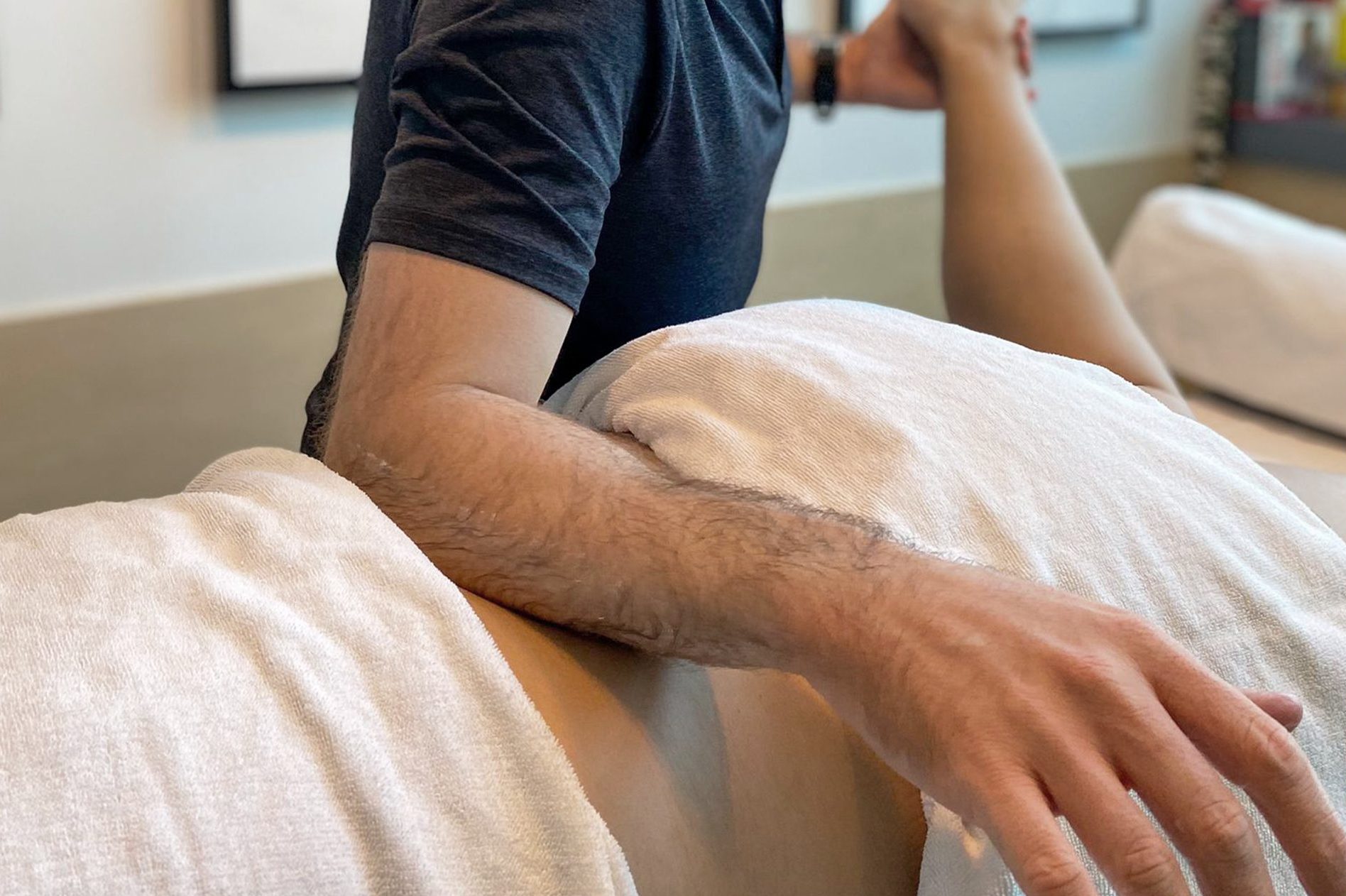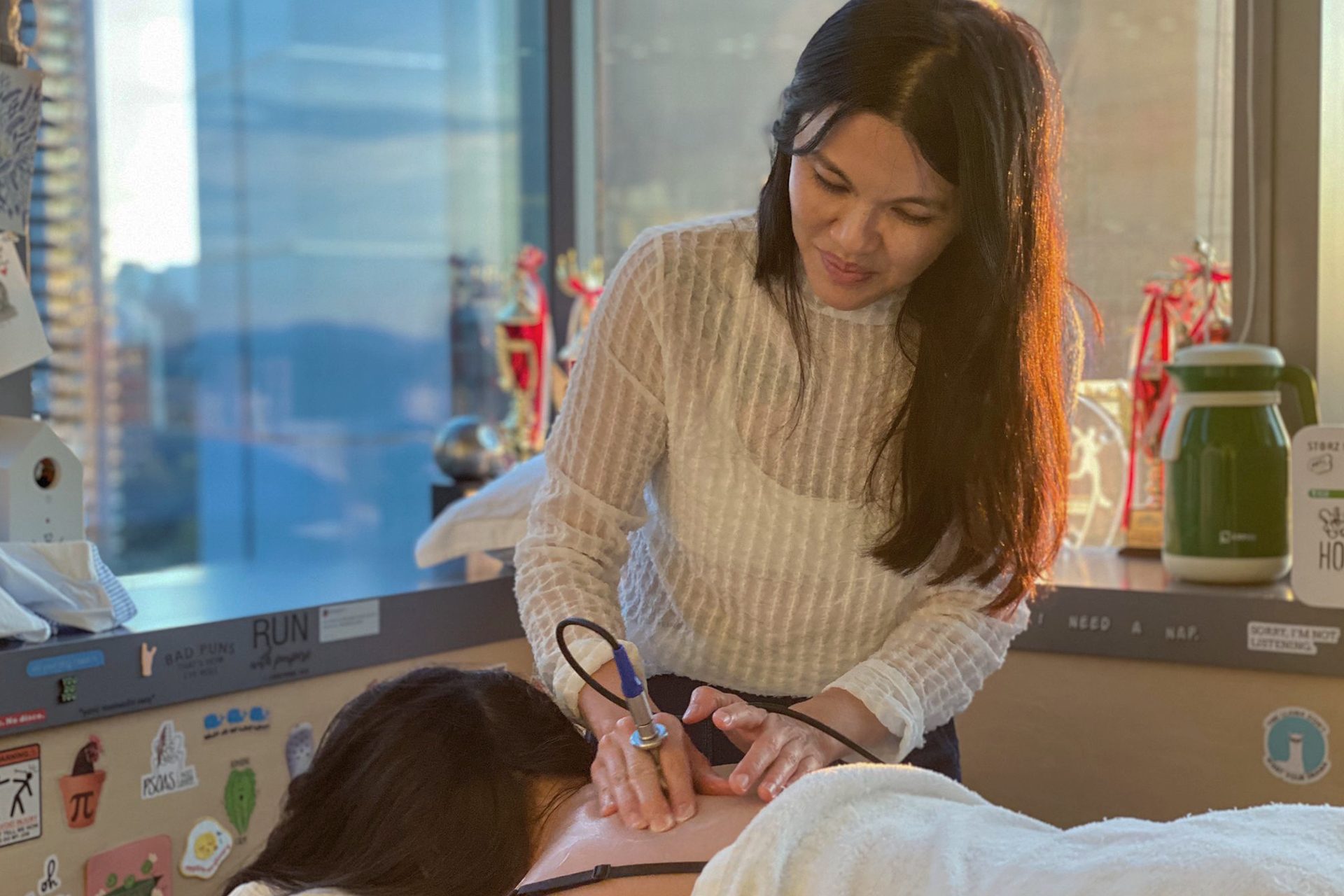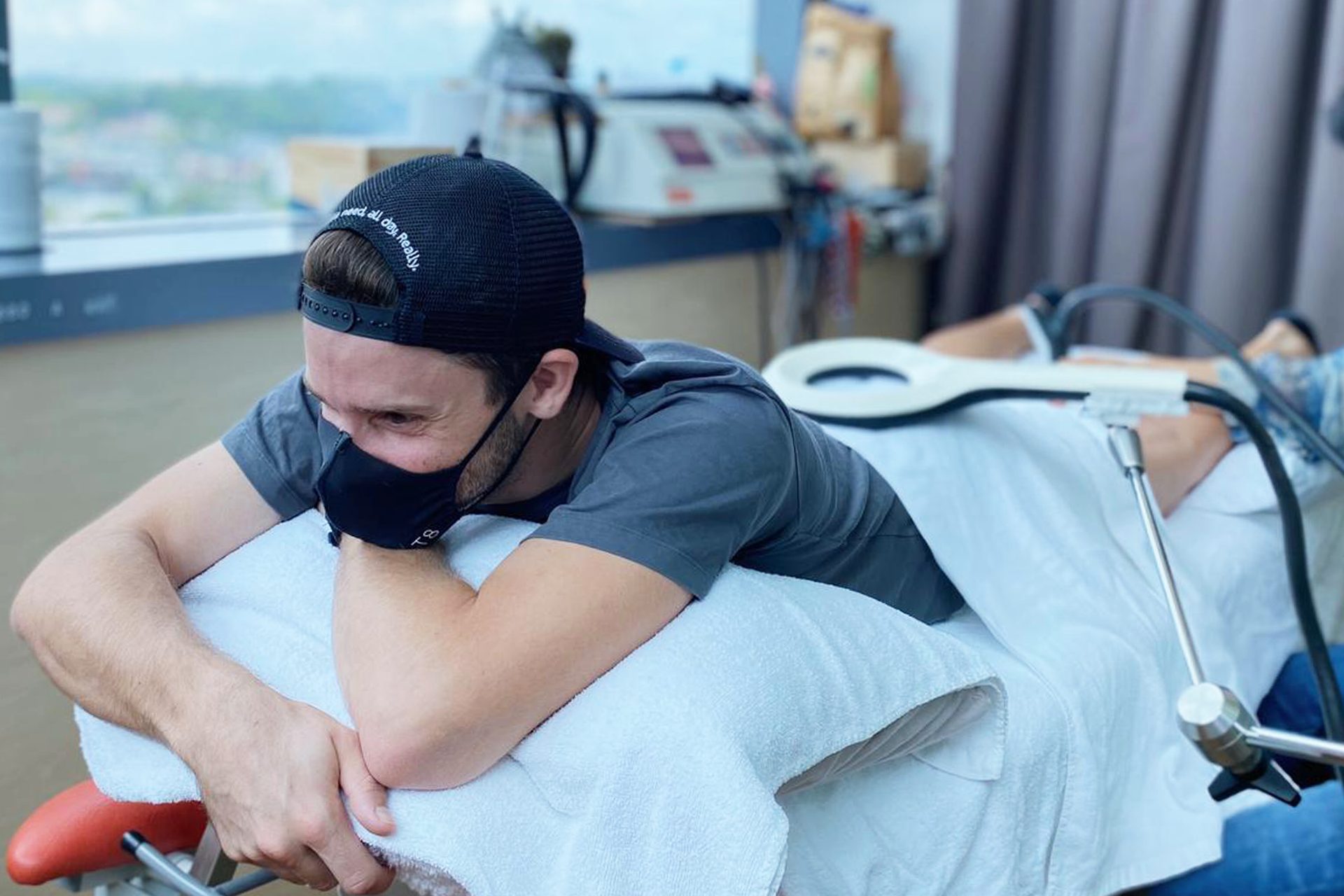Musculoskeletal Disorders
Back Pain and Physiotherapy

Common Causes and Symptoms of Back Pain
The back, with its intricate network of bones, tendons, nerves, and muscles, can be prone to a range of injuries, requiring interventions like back injury physiotherapy. Any of these components can become injured or misaligned, leading to discomfort or more severe pain.
Explore Back Conditions
Nonsurgical Treatment to Prevent Back Injuries
Conservative, non-invasive treatment for a patient’s back pain depends strongly upon its cause and location. Many conditions, however, can be at least partially relieved by a combination of physiotherapy treatments, including back care physiotherapy and physiotherapy techniques for back pain:
INDIBA Activ
Ideal for chronic low back pain conditions like osteoarthritis, uses radiofrequency to break the pain cycle, reduce pain, and improve function. It is used in conjunction with physiotherapy exercises for lower back pain to build strength and enhance movement patterns.
Shockwave Therapy
Employs ultrasounds to boost nutrient uptake back into the discs, breaking down scar tissue in a damaged spine area to improve movement and mobility, enabling faster recovery.
MAGNETOLITH
Employs high-frequency oscillating magnetic fields with deep penetration to stimulate the healing process. Unlike shockwave therapy, which is targeted, MAGNETOLITH works over a more extensive area, particularly useful for conditions like spondylitis that afflict multiple vertebrae simultaneously.
LightStim Red Light Therapy
Sends specific lightwaves into your cells to fuel the mitochondrion, prompting growth and regeneration. Red light therapy is effective in treating arthritis and related conditions, like osteoarthritis, by slowing joint degeneration, reducing inflammation, and improving blood circulation.
Clinical Pilates
Builds strength by enhancing core muscles and range of motion to tackle biomechanical imbalances. Back injuries often result from compensations due to a weak core or muscle group misfiring.
Sports Massages, akin to physiotherapy massage for back pain and massage for back pain Singapore practices, zero in on your back’s most uncomfortable region. For muscle strains or other soft tissue-related issues, a sports massage offers the pain relief in SG you’ve been seeking.
Dry Needling
Myofascial back pain syndrome activates the body’s healing through needle-induced microtears. These “tears” kickstart the natural immune process, attracting nutrient-rich blood to an injury site and promoting tissue regeneration.
Musculoskeletal dysfunctions can drastically curtail daily functions for those with lower back conditions. You need not endure back pain or chronic injuries. Through manual therapy to reinstate optimal movement patterns and supportive modalities, HelloPhysio amalgamates groundbreaking therapies to address your back pain effectively. Delve into our pain relief practice to further understand the myriad benefits of physiotherapy for back pain.

Physiotherapy Low Back Pain Management
Physiotherapy, especially in the context of back pain physiotherapy management and low back pain physiotherapy in Singapore practices, is one of the most widely accepted treatments in healthcare.
Often used either as a standalone therapy or in conjunction with complementary modalities like radiofrequency, magnetic transduction, massage therapy, soundwave, Clinical Pilates exercises, or low-level laser light therapy, physio treatment for back pain is holistic and comprehensive.
The human back, an intricate ensemble of vertebrae, discs, joints, tendons, and muscles, due to its interconnected nature, requires precise and tailored interventions when pain strikes. Whether it’s through strengthening, stretching programs, or cutting-edge technologies, our clinical practice focuses on interrupting the pain cycle, positioning you on a path to prevent future back adversities.
During your initial consultation, our seasoned physio – often considered among the best physio for back pain – assesses the intensity of your musculoskeletal condition, setting the stage for a bespoke rehabilitation strategy. Once diagnosed, our adept clinical ensemble crafts a tailored regimen, potentially integrating exercises to fortify abdominal muscles, glutes, or leg muscles, enhancing your lower back’s support system.
In harnessing advanced tech in the physio and back pain sphere, methods like Shockwave Therapy might be used to catalyze healing, or INDIBA Activ to quell inflammation. Activities like Clinical Pilates further solidify core strength, offering your back the support it warrants to operate pain-free.
Should our physiotherapist deduce that your lower back pain is rooted in a graver issue, such as a tumor necessitating urgent medical intervention, rest assured, we’ll channel you to the apt medical specialist.

Treatment of Upper Back Pain
The upper back, compared to the lower back and neck, presents a greater resistance to injuries. While it’s less susceptible to damage, it’s not entirely immune. Many upper back conditions are rooted in muscle instabilities and imbalances originating from different parts of the body.
Commencing any treatment for upper back pain, much like the approach for lower back pain, necessitates an initial consultation and assessment. This allows us to gauge the intensity of your discomfort, understand your medical history, and tailor a pain management treatment plan exclusively for you.
At HelloPhysio, our evidence-based team offers comprehensive physiotherapy of back pain, ensuring a holistic approach that delves not just into the symptoms but also the root cause of your pain, be it a sudden injury or a chronic ailment.
Whether the upper back discomfort springs from sports-related injuries, or it’s the outcome of long hours hunched in front of a computer, our back to back physiotherapy approach evaluates how your day-to-day activities influence your overall musculoskeletal wellness.
Our specialized team, known as the back physio experts, will work with you to develop physiotherapy for back pain treatment tailored just for you. This may include prescribed exercises to stretch, enhance mobility or strengthen weaker muscles.
Alongside these, our noninvasive therapies, such as back massage physiotherapy, work synergistically, augmenting the body’s innate healing abilities at the cellular level, ensuring a cessation of the pain cycle and sustainable relief from musculoskeletal discomfort.

Prehabilitation and Physiotherapy after Back Surgery
Today’s sedentary lifestyle, characterized by prolonged desk jobs, binge-watching sessions, or even sudden, intense physical activities, has exacerbated the prevalence of back pain in our society.
At HelloPhysio, we frequently encounter patients who resort to temporary fixes, such as painkillers, to numb their discomfort, bypassing the underlying root cause of their persistent back pain.
Enduring back pain doesn’t have to be the norm. If left untreated, the condition tends to intensify, progressively diminishing your mobility as you age. Don’t let the pain hold you back. Consult with our renowned back pain physiotherapist at HelloPhysio.
As a leading physiotherapist back specialist in Singapore, we offer targeted back pain treatment, integrating physiotherapy for back pain and soothing physiotherapy back massage techniques to holistically address and alleviate your discomfort.
Schedule an appointment and let us guide your journey back to optimal spine health.
Back Pain Physiotherapy Consultation
Back pain proliferates in our modern-day society, especially as we sit for prolonged periods behind a desk at work, relax in front of the TV watching Netflix, or take up sports to benefit our health. HelloPhysio sees many patients who come into our clinic who rely on painkillers to relieve their discomfort, masking the pain without addressing the underlying root cause of their niggling back pain.
You don’t have to live with back pain as the condition typically worsens over time reducing your mobility as you get older. Schedule an appointment with our leading clinic for back pain physiotherapy in Singapore to get a proper assessment of your condition.
